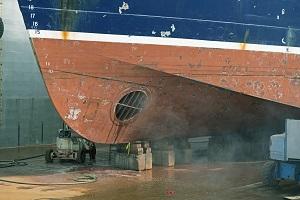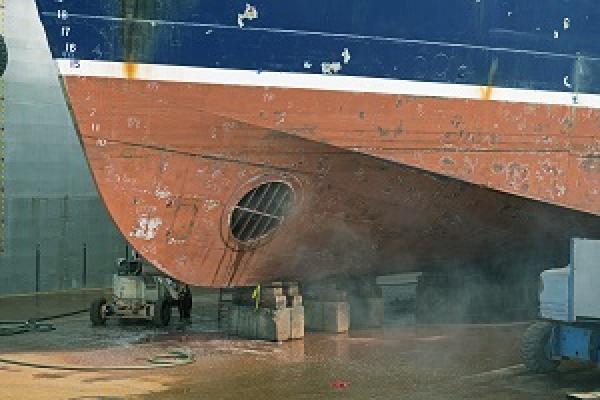
Steamship Mutual
Published: July 01, 2016
Image


Hull fouling is a well-known problem affecting vessels trading in tropical water ports. It can lead to loss of time from diminished vessel performance and lost time and costs associated with hull cleaning. Disputes arising from such fouling can be costly and complex.
Back in 2005, Steamship Mutual supported a Charterer Member in its successful defence in the benchmark case on hull fouling - The Kitsa . In The Kitsa, it was held that the charterers had given legitimate orders to the vessel and that the port of call was within the permitted trading limits of the charterparty. It was also found that the risk of fouling at that port had been foreseeable by owners and charterers on fixing the charterparty and that the fouling was not fortuitous as, particularly, the vessel had not sat at that port for a period longer than was usual for that type of vessel trading at that port. Therefore, the risk of fouling was considered to be an operational risk which owners had agreed to bear when fixing the charterparty and there were no grounds on which owners could claim an indemnity from charterers for the cost of cleaning the hull.
Some years later BIMCO published a clause to address hull fouling as a result of a prolonged stay in tropical waters in compliance with charterers’ orders. The clause states that if the vessel remains in a tropical zone or outside such a zone for more than an agreed period of time “.. any warranties concerning speed and consumption shall be suspended pending inspection of the vessel’s underwater parts….” and that either party can call for an underwater inspection to be arranged jointly by owners and charterers. When cleaning is required, this is at charterers’ “… risk and cost …” but under the Master’s supervision. However, if owners for whatever reason refuse to permit cleaning, charterers are entitled to reinstate the speed and consumption warranties. In contrast if cleaning is not permitted or possible, or charterers decide to defer cleaning, the charterparty performance warranties remain suspended until cleaning is performed.
However, the parties to a consolidated appeal recently heard in the Commercial Court – The Coral Seas - had not made provision for the effects of hull fouling and the question that fell to be decided on appeal by Mr Justice Phillips was:
"Where under a time charter the owner warrants to the time charterer that the vessel shall maintain a particular level of performance throughout the charter period, and the time charterer alleges underperformance in breach of that warranty, is it a defence for the owner to prove that the underperformance resulted from compliance with the time charterer's orders?"
The head and sub charterparties were, so far as set out below, back to back and each contained the following relevant terms:
"1. … whilst on hire … Owners shall … keep the vessel in a thoroughly efficient state in hull … machinery and equipment … for the service and all times during the currency of this Charter.
8. … the captain shall prosecute his voyages with the utmost despatch … The Captain ... shall be under the orders and directions of the Charterers as regards employment and Agency …
Clause 29
(b) Speed Clause
Throughout the currency of this Charter, Owners warrant that the vessel shall be capable of maintaining and shall maintain on all sea passages, from sea buoy to sea buoy, an average speed and consumption as stipulated in Clause 29(a) above, under fair weather condition not exceeding Beaufort force four and Douglas sea state three and not against adverse current.
In the course of trading, the vessel waited for a berth at Guaiba Island, from 14 January to 10 February 2008. It was clear on departure that the vessel's performance had fallen off significantly. At Singapore an underwater inspection found light fouling of the flat bottom and heavy fouling of the propeller by barnacles. The propeller was cleaned underwater.
Sub charterers (and in turn head charterers) made deductions from hire, asserting a right to set-off damages for breach of the continuing speed warranty contained in clause 29(b) of the charterparties. The claims were referred to concurrent London arbitrations heard by a common tribunal.
The tribunal made the following findings of fact:
i) the vessel did not maintain the warranted speed;
ii) the cause was underwater fouling of the vessel's hull and propeller by marine growth, as a result of the lengthy stay in tropical waters; and
iii) the marine growth could not be regarded as unusual or unexpected, but constituted fair wear and tear incurred in the ordinary course of trading.
The tribunal held that, on a true construction of the charterparties, the speed warranty in clause 29(b) applied to all sea voyages, including those after a prolonged wait in tropical waters and that it was the owners/head charterers who had assumed the risk of a fall-off in performance as a result of fouling consequent upon head charterers'/sub charterers' lawful orders.
Owners and head charterers sought leave to appeal. Inter alia, they asserted that the tribunal’s reasoning was wrong, being contrary to the principle of law as stated in Time Charters 7th Ed. (2014) paragraph 3.75 as follows:
"Where the owners give a continuing undertaking as to performance of the ship, and the ship has in fact underperformed, it is a defence for the owners to prove that the underperformance resulted from their compliance with the charterers' orders: see The Pamphilos [2002] 2 Lloyd's Rep 681 per Colman J., at page 690. In that case, the ship's failure to achieve the promised performance resulted from marine fouling, which was in turn the result of the owners' complying with the charterers' order to wait for 21 days at a tropical port."
Males J had given leave to appeal on the basis that, if the tribunals’ finding were correct, a passage in the leading textbook is wrong or at least too widely stated, thus the awards were of some general interest and at least open to serious doubt.
Phillips J considered the leading authorities in making his decision.
It is established law that a shipowner has an implied right of indemnity against a time charterer in respect of the consequences of complying with the charterer's orders as to the employment of the ship, even if the orders were ones the charterer was contractually entitled to give. However, it is equally well established that such indemnity does not extend to the usual perils of the voyage in respect of which the owner must be taken to have accepted the risk: The Island Archon [1994] 2 Lloyds Rep 227 CA.
As explained above, in The Kitsa the vessel's hull became seriously fouled due to delay in warm waters. Owners claimed the cost of cleaning from the charterers under the implied indemnity. Aikens J recognised that, in the broadest sense, the hull fouling was caused by the charterers' orders to go to Visak, but held that the cleaning costs were outside the implied indemnity as they were a risk the shipowner must be taken to have agreed to bear.
In ENE Kos 1 Ltd v Petroleo Brasileiro SA (No 2) [2012] 2 AC 164 , Lord Sumption, took the same approach to the scope of an owner's indemnity, expressly recognising that the indemnity did not apply to marine fouling occurring in the course of contractual trading:
"… The owners are not entitled to an indemnity against things for which they are being remunerated by the payment of hire. There is therefore no indemnity in respect of the ordinary risks and costs associated with the performance of the chartered service. The purpose of the indemnity is to protect them against losses arising from risks or costs which they have not expressly or implicitly agreed in the charterparty to bear. What risks or costs the owners have agreed to bear may depend on the construction of other relevant provisions of the contract, or on an informed judgment of the broad range of physical and commercial hazards which are normally incidental to the chartered service, or on some combination of the two. The classic example of a loss within the indemnity, and probably the commonest in practice, is one which arises from the master complying with the charterers' direction to sign bills of lading on terms of carriage more onerous than those of the charterparty … On the other hand, the indemnity will not apply to risks which the owners have contractually assumed, which will usually be the case where they arise from, for example, their own negligence or breach of contract or consequences such as marine fouling which are incidental to the service for which the vessel was required to be available."
In light of the case law, the tribunal had held that the owners had assumed the risk of a fall-off in performance as a result of marine fouling and that therefore the indemnity had no application.
On appeal before Philips J, owners' did not seek to rely on an implied indemnity. Their case was that the speed warranty should be construed as being given on the basis that the vessel continues to have a clean hull and propeller. Consequently, if the vessel suffered marine fouling in the ordinary course of the charterers' use of the vessel, the owners would be responsible for cleaning the hull (and/or could not claim damages on re-delivery), but the charterers would not be entitled to treat the vessel as off-hire, nor claim for a diminution in performance.
Owners argued that the above approach to the contractual "scheme" was recognised in The Pamphilos and reflected in the passage in “Time Charters”, neither of which was considered by the tribunal. In The Pamphilos, the arbitrators had decided that marine growth was an ordinary incident of trading in accordance with the charterer's orders so that the charterer was not in breach of the re-delivery obligation, but nonetheless had determined that the charterer's deduction of hire for underperformance was unjustified.
In reaching his decision in the appeal, Phillips J concluded that as the warranty was that the Vessel "shall be capable of maintaining and shall maintain on all sea passages," the warranty was not limited to the vessel's capacity as a new builds, but related to her actual continuing performance.
Further, the parties had agreed a restriction on the extent of the performance warranty, limiting it to passages under fair weather conditions. It would have been open to the parties to have excluded voyages after the vessel had been waiting in tropical water ports, and such clauses are now commonly included in time charters. Owners were seeking to construe the warranty as containing an exclusion which the parties chose not to agree.
He rejected the contention that the continuing performance warranty did not apply where the vessel's performance fell-off because of fair wear and tear in the course of contractual trading. Whilst recognising that Colman J expressed the opposite view in The Pamphilos, that was in the context of refusing leave to appeal under s.69 of the Arbitration Act, and was only reported because the application for leave was dealt with at the end of a judgment on an appeal under s.68. Further, the terms of the speed warranty in that case were not set out in the report and it does not appear that the cases on the application of the implied indemnity were cited.
Phillips J concluded that the proposition stated in paragraph 3.75 of Time Charters is too widely stated. Where a vessel has underperformed, it is not a defence to a claim on a continuing performance warranty for the owners to prove that the underperformance resulted from compliance with the time charterers' orders unless the underperformance was caused by a risk which the owners had not contractually assumed and in respect of which they are entitled to be indemnified by the charterers.
Article by Sian Morris


